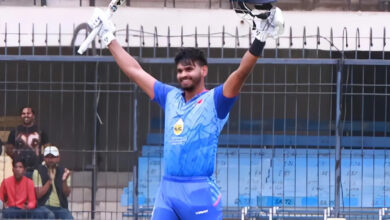Len Watch Read: When Socrates and Corinthians took on Brazil’s dictators

Sport in the multiverse works in different dimensions, beyond Live Action. It is heard and seen and pored over in retellings wordsmiths. The Express Sports team picks out the best podcasts, docus, OTT series and book recommendations for sports lovers, every week in LWR – Len Watch Read
Football rebels: Socrates and the Corinthians DemocracyThe Social Football Club: YouTube; 25 minutes
Sao Paulo-based Corinthians had landed in Japan for a tour following a 30-hour flight. Their forward Walter Casagrande, however, was missing his girlfriend, whom he had met just three days before departure, and wanted to fly back. The players were divided on letting Casagrande have his way. So they voted, says Wladimir, the former defender. The vote was in favour of Casagrande staying back with the team in Brazil, Wladimir says laughing loudly.
The issue at hand may seem trivial, after all it was a lovelorn footballer trying to get his way. But the ‘one vote for one person’ policy within the club was a source of hope for millions of Brazilians who wanted the two decade old military dictatorship to end. What came to be known as ‘Democracia Corinthiana’ was led the lanky and bearded midfielder and doctor profession Socrates, with Wladimir being a strong advocate. Not just the players, the masseuse, doctors, trainers had a vote, says Wladimir. The high-handed generals were not happy with the messaging, the Sao Paulo businessmen and the press turned against the club.
“They thought we were anarchs… they even called us beared commies,” says the then club president Adilson Monteiro Alves, who bought into the idea. The mini-documentary is anchored former French footballer Eric Cantona and contains interviews with the main players behind the Democracia Corinthiana movement, including Socrates and former president and left-wing leader Luiz Inácio Lula da Silva, who incidentally is involved in a close race with current far-right president Jair Bolsonaro as Brazil heads into a run off.
Back in the 1980s with Brazil under the grip of dictatorship, the club’s jersey was used as a means to push for elections. On the back of the jersey was printed Democracia Corinthiana with spots of red, which symbolised blood. It looked like a Coca Cola logo, says Alves When the team was summoned the generals after winning the competitive São Paulo in the early 80s, they presented a jersey to president Ernesto Geisel and said ‘it’s just football’, recalls Alves. Every week when the Corinthians players scored goals, their pictures were printed in newspapers and the message on the back of their shirts were seen millions of football fans.
“Corinthians Democracy concerned football but at the same time not only football. It embodied the dream of every Brazilian of removing the dictatorship and a return to universal suffrage,” Washighton Olivetto, a renowned public remembers.
Thanks to Socrates’ interests beyond football, his teammates also were exposed to different ideas. For team lunches on Fridays and Saturdays, singers, painters, film makers, architects were invited to join them.
If Socrates had a good debate or exchange of ideas he played well.
One of the biggest statements against the dictatorship was when the Corinthians players held a huge banner that said ‘win or lose but always with democracy’ and walked on the field on the final day of the championships in 1982, a year they defended their Sao Paulo Championship.title. The mini-documentary also has footage of Socrates addressing lakhs of people in Cathedral Square where he made the promise that if a referendum to allow direct presidential elections didn’t go through he would play in Italy. “How many great players do you know who tie their transfer abroad to a constitutional amendment,” asks Wladimir.
In 1984, the amendment for direct elections was defeated and Socrates left to play for Florentina after getting offers from clubs from all over Europe. He played for one season and returned to Brazil to urge people to vote when the dictatorship ended in 1985.







